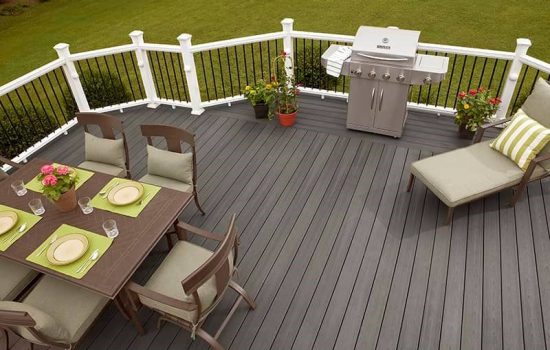Are you ready to elevate your outdoor living space with a stunning new deck, but feeling overwhelmed by the choices? As experts in deck building for over 10 years, specializing in both wood and composite materials, KP HOMESCAPES can help you make an informed decision that fits your needs and budget.
Wood is a timeless classic, often more budget-friendly compared to composite materials. Many homeowners appreciate the natural beauty of wood, which can be enhanced with stains, paints, and varnishes. Pine, cedar, and redwood are popular choices for decks due to their natural resistance to rot and pests.
On the other hand, composite materials offer unparalleled strength and durability, with minimal maintenance required. Composite products are highly customizable, available in a wide range of attractive colors and designs, and boast a longer lifespan compared to wood. However, it’s worth noting that composite materials are generally more expensive than traditional wood products.
Consider the disadvantages of composite decking when seeking a long-lasting and aesthetically pleasing deck or outdoor structure.
Disadvantages Of Composite Decking?
Composite decking has become a popular choice for homeowners in recent years. Composite wood is made of a combination of two materials, wood and plastic, which are combined to create a deck that is both long-lasting and easy to maintain.
However, there are some cons of composite decking that manufacturers like Trex don’t like to mention often. Do you know them? You will very soon!
Disadvantages Of Composite Decking Vs Wood Decking?
Although this new material has many advantages, there are several disadvantages of composite decking in comparison to wood:
- One of the primary disadvantages is the up-front cost. The cost of composite decking is higher than traditional lumber, which can make it a less affordable option for some homeowners.
- Composite decking also requires special skills for installation. For example, some decking products require contractors to have a certification to make the warranty valid once installed. This means that not all deck builders offer composite decks.
- Composite decking is not as strong as wood. This doesn’t mean that it’s weak or likely to break – it just means that it can’t hold as much weight. Since it’s not as tough as some types of wood, it can’t be used for the frame of the deck, especially if it’s a large deck. Most composite decks are actually built with a wooden structure.
- It can get hotter than wood in direct sunlight. Composite decking also tends to be hotter than traditional wooden decking, so it may not be the best choice for areas that get too hot in the summer.
- Composite decking is not 100% resistant to rot, mold, and mildew, especially in very shady or humid conditions. Although it is more durable than real wood, it doesn’t mean that it is completely indestructible. If you want a decking material that is completely rot-resistant and moisture-resistant, opt for 100% PVC, capped polymer decking boards (like Azek Decking).
- Finally, some people simply prefer the look and feel of real, natural wood. Some types of composite decking can look fake and plastic-like according to some people, which may not be the aesthetic that you’re going for in your home. However, keep in mind that decking manufacturers are always improving the appearance of their products, so the composites of today are not what they used to be. We’re sure you can find one that you like if you compare samples from different brands.
Disadvantages Of Composite Vs PVC Decking?
The two main types of man-made decking materials are composite and PVC (polyvinyl chloride). Both options are popular because they offer a long list of benefits, including durability, easy maintenance, and low-cost upkeep. But how do these two artificial materials compare?
PVC pros:
- PVC Decking is more durable.
- PVC is more heat-resistant. Composite can get hotter than some PVC brands in direct sunlight.
- PVC is 100% immune to rot, mold, and mildew growth.
Composite pros:
- Composite is cheaper than PVC decking.
- Generally speaking, composite decking looks more natural and “wood-like” than PVC decking.
Disadvantages Of Composite Decking A Deal breaker?
While composite decking does have some disadvantages in comparison to wood, such as the higher up-front cost, these disadvantages are not a deal breaker for most people.
Composite decking offers the possibility of a beautiful, long-lasting, and easy-to-care deck with no hassle. It saves you money in the long run too!
If you’re still not sure which type of decking to choose, we suggest that you compare samples from different brands to see what you like best.
If you live in Maryland and are interested in composite decking for your home, contact KP HOMESCAPES today. We would be happy to help you choose the right materials for your needs.

